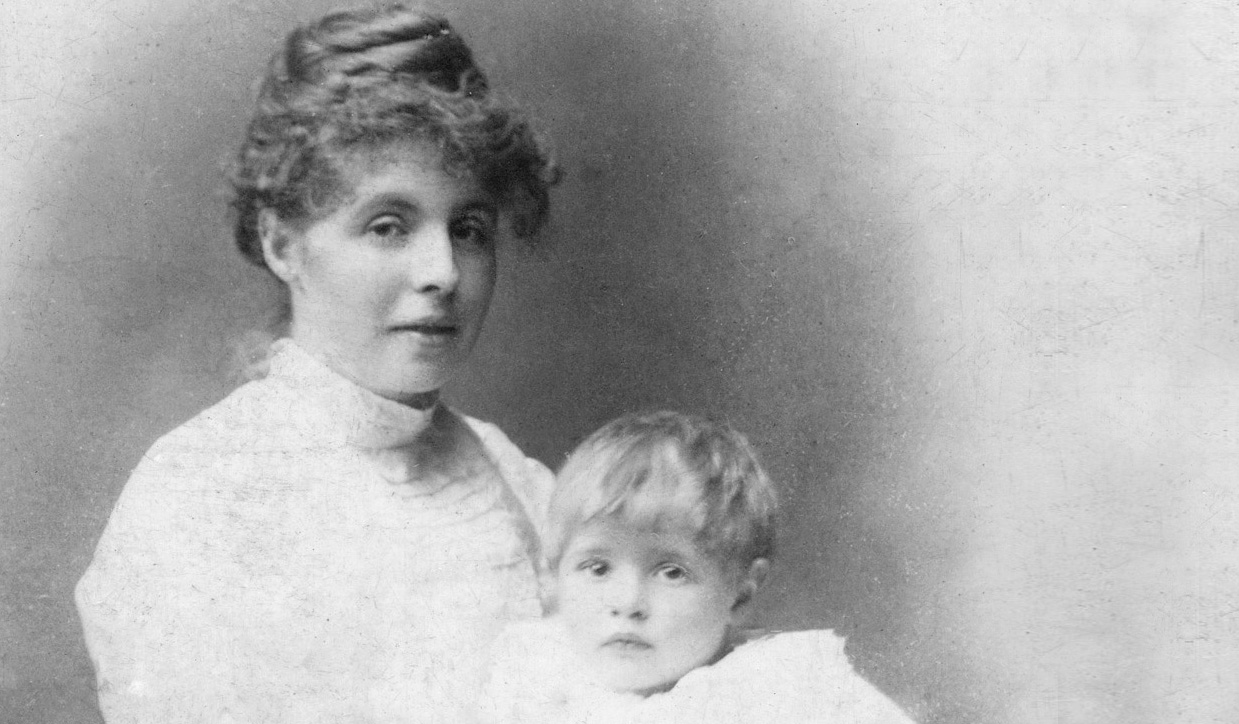We went to London. We do this journey quite often, from here, the east it is a fairly routine trip, a day out; one of those the ever shortening distances that only just hold us all apart. We have offspring who have set up shop there in the expense and dull glitter, the piss coloured glow emanating from the golden pavements a visible draw even now in these days of oppressive rents and low-waged jobs. Before we had children and the bruising wheel of life got in the way of living it we used to go a lot, skulking in Soho, or to the market and gigs in Camden; The Falcon, Electric Ballroom or Dingwalls, I’d go and kip on a couch somewhere, or we’d stay in Muswell Hill with my wife’s dad. The travel itself had no real resonance I’d not learnt to travel beyond recognising the destination. Usually we hitched; Everybody was skint, nobody had a job much beyond YTS or MSC schemes that were more an exercise in massaging the back of the Tory unemployment bogeyman than about creating real jobs. So, I or we would pitch up on Newmarket Road, sometimes joining a queue, stick out a thumb then work your way up the queue of other similar hitchikers where you might eventually get picked up, remaining in hope some kindly bored soul would see past the imagined muggers and pick us sparkly eyed young things up. The journey would usually be bland, three hours sat in the passenger seat of an executive Vauxhall or Ford with a salesman whose mind wandered as much as the car did between the white lines. Sometimes a lorry driver would stop just glad of the prospect of some company, someone to share stories with. It was generally fun.
I met a fabulously flamboyant sex toy salesman, driving a small van of dildos and pornographic chess sets around East Anglia. Had a lift from Bournemouth with a lovely female doctor who insisted on taking me fifty miles further than she needed too because she was bored at the prospect of a family party. Got picked up on the edge of Manchester by a truck driver who took me to a diner and fed me up, nipped round his house, parking his never-ending truck neatly against the kerb outside his neat semi in Watford where he lived with his mum so we could have a proper cup of tea. I got hauled into a Capri at Redbridge and dumped at the wrong place in the middle of the night in the rain by a speed freak too busy chewing his own cheeks to take any notice of the destination. There were kindly AA men who shouldn’t have picked us up at all, but came back to get us at four in the morning at Stump Cross because a storm swept in and they were worried we might catch our death – took us to Red Lodge and bought us tea and toast.
The vicarious nature of the method meant little then, but has a different resonance now in our memory. It is, in Britain at least, something that is almost a lost art, fading like tail-lights in the rain somewhere in the 1990s parallel with the growth of navel-gazing paranoia as the newly co-opted corporate brass-eye of the media swept us all up and started to roll out what is now the constant ticker-tape – what could happen if you stray from the mindless car and house, children, consume litany that we’ve all bought into. Alt-culture was trampled in a bean field and trust curled up and died back then. There was something almost whimsical about the almost fear-free slot-machine chances we took on the side of the road, terminated by post-Thatcher society folding in on itself, cradling new found possessions, keeping that purse safe and out of site, the evidence of this growth of this outward lack of social awareness still surrounds us all.
The railways have also changed. In the 1980s we could afford them then at a push even though there was little spare money. The carriages were carpeted with fag ash and the heaters didn’t work, but chances are it only cost few pounds and you rarely had to stand. For most of us now, trains are no longer viable or affordable unless you want to travel at inconvenient times or are prepared to pay through the nose. Public transport on the networks has become increasingly elitist and not terribly public, concentrating instead on racking up profits for the privateers at the expense of the citizens, money out of pockets and out of taxes buying them islands and private jets, paying into pension investment funds. So, we all drive endlessly, and I now only see spaces where there used to be people thumbing it, when I can in fact take my eyes off the overburdened roads.
We also tend to drive down now, simple economics, half a tank of diesel plus a few pounds to park at Epping station. Early arrival guarantees a spot. Charge up an Oyster, that prosaically named card; food for millennia for the poor, now both a luxury and the payment gateway to the underworld. The mass transit of the urban population joining us together in those warm damp human filled arteries that feed the money industries from the expanding edge land and fringes of the city where people can still just about afford to live.
In 1970 we made the whole trip at 50 to 60 miles per hour in the rust and wood of a Morris Minor. It probably took four or five hours; a concentrated uncomfortable drive in bad seats in a car that stank of cigarettes and petrol. I can’t really remember much of the trip only the smell, the sound of the gear changes, the faint hiss and rumble of the thin tyres on the road. There was a petrol station set back slightly in some trees near Epping, we bought petrol, served by a man wearing a a caretakers coat, he pumped the petrol, and inside at a wooden counter as tall as my eyes he took the money. Behind him on shelves were two dozen jars of jewel coloured sweets. If you’re good you get a paper bag screw-cornered closed, tight packed with rainbow dust, some psychedelic sugar hippy hangover from the sixties, laden with toxic colouring, acetic acid and fake-fruit flavour, eaten with dipped and licked fingers, sticky, sickly and teeth killing.
My memory associates the area with being small, going to see my dad’s family in the East End. There was a particular picnic spot, we sat next to the car on a set of tables and benches in a pull in spot on the edges of Epping Forest, grey sky with etched pieces of blue, trees with light bark and small leaves like flashing flipped coins. I couldn’t identify the area now if I wanted to, but it still doubtless exists somewhere, mainly it lives in my mind, almost just a feeling now, the grey silver of birch trees cutting upwards. I know it’s near because I remember it being talked about; Epping, the whole place when you pull off the M11 feels so ridiculously familiar, like an old hand print pushed into concrete you pass every day.
My family hadn’t long left London in reality. My dad had been in the RAF, stationed at RAF Stanmore to the North of London where I was born. My mum worked as a midwife at the local General Hospital. I don’t really remember the place at all, not much of it exists any more; the houses in the married quarters long-since demolished, replaced by Eco-homes. I was two when we left, there’s some bare and vague imprints of the place on my mind, but it’s hard to tell how much is real and how much received, a hallway, a fireplace. But I know all the names, the places, and I know that during the week my dad stayed in the house that had been the family home in Leyton since 1944, not far from the Leyton High Road where two of my aunts still lived. We have letters that date from 1967 to 1969, passed up the roads and by rail away from the smoke and the city to a council house in Vale Green on the Mile Cross, my mum, my sister and I already deposited there as part of an RAF resettlement package, while my dad worked out his last bit of 35 years of passage through the services and moved into a job at Her Majesty’s Stationery Office. He moved between the two cities for over a year, while HMSO planned it’s escape to Norwich with him.
The underground part of the trip is always a temporal curiousity for me; a journey back in time, one that goes back in my memory further than simply hitch-hiking in the 1980s, it goes back past my birth. An old landscape opens up every time we do the trip. Out of the car and on the scabbed tarmac at Epping with South Weald at our shoulder is where the journey really becomes part of the destination for me, a weird junction for the generations, layers of development over my own human archaeology, the horizons of different personal past-scapes. Where then and the instant of now start to touch and gradually wind around each other along the tracks and through the tunnels. And so it begins, the places on the tube a poem, a litany like some personal shipping forecast where I understand the places and where they fit into a map. It’s a route that goes not just along but backwards in time right back to the beginnings of the known family history – around Broad Street, Bow, Bishopgate, Stratford, Spitalfields, Mile End, and Hoxton. A time map that marks the ebb and flow of the strands of a family in and out of London, backwards and forwards to Essex and on to East Anglia for over 300 years. And so I go back to where we begin, I am there with them. The wheels of the tube softly ticking-tacking through Theydon Bois, Debden, Loughton, Buckhurst Hill and Woodford…
Phyllis my father’s sister-in-law is the last of the last, she remains in Woodford Green, the last living link with my dad and his family. She married the youngest brother of the eight, Richard, he too has gone, his mellowed East-End accent and slicked back silver hair now part of the texture of our family history. My Aunt sent me a soft-toned letter, one riddled with pride and loss, wrapped inside were photos of him and her and some of my other aunts and uncles. I’d never seen these photos before, holiday snaps of my Aunt Grace with her friend, and I think probably life partner, Lilly, in Cornwall. My grandparents camping, peeling spuds in a bucket under a stretched tarpaulin, sisters standing in a narrow garden peering out of the past. And there, baby-faced full square and shoulders slightly turned is Richard, the youngest Petty Officer in the Royal Navy in the latter days of the Second World War, not even out of his teens. Then photos of him and Phyl on the same holiday in the South-West with my aunts. In the photos he’s not the slightly stooped older man I knew, this is the grown boy mum said idolised my dad, he pestered them when they were courting, semi-innocently got in the way. I have a copper ashtray he made my dad, a wooden tripod plant stand, schoolboy creations from 80 years ago. I don’t remember him especially well, he looked and bit like George Cole, him and Phyl visited, they admired my Dad’s roses and the vegetable patch and said Norfolk was nicer than Leyton and Walthamstow.
The train slides on through snatches of fields between back-to-backs, odd towers, the blank metal shuttering of industrial units, power-lines and substations, distribution centres, warehouses and services blur in the rain. The spleen and organs feeding the heart. Lights on in bathrooms and bedrooms, South Woodford, Snaresbrook, Leytonstone and Leyton…
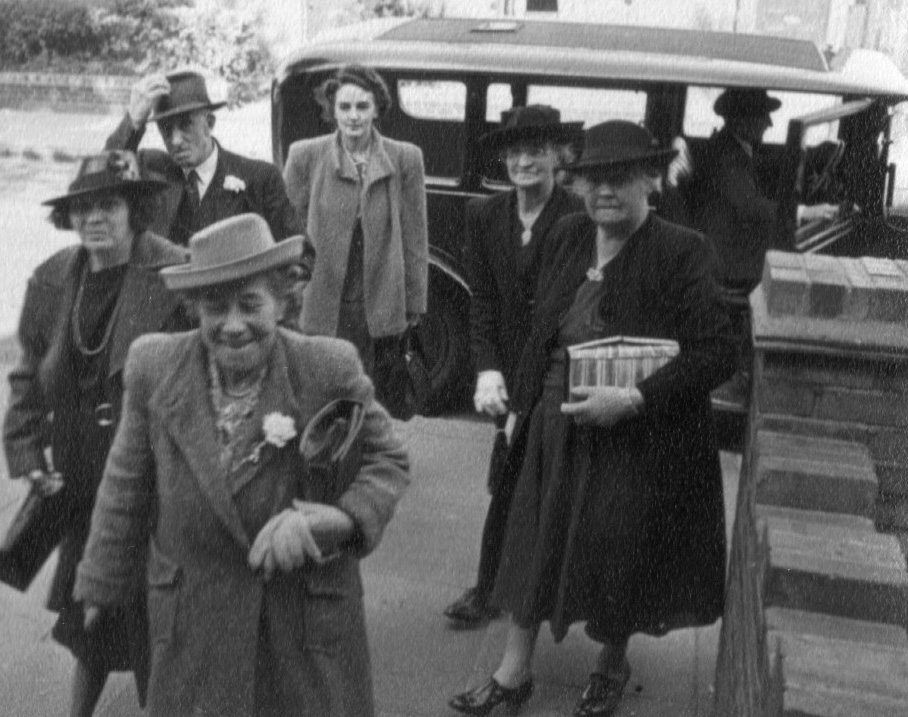
They’d been bombed out of a house not far from the Leyton High Road, It sat anonymously half way along Carnarvon Road. The family had lived there since the turn of the century, part of the nation of renters feeding the late Victorian capitalists. It was a small terrace that could be anywhere, standard issue worker’s house, minimum space, no bathroom, outside toilet, the usual fare. Originally it was shared by my Grandparents Albert and Florence and their respective brother and sister Samuel and Elizabeth. They lived together, brother and brother marrying sister and sister. Eventually children arrived and Sam and Bet moved two doors away. I’ve visited the house like a Streetview ghost turning mid-road nine feet up in the air, looked at the oddly filled gap opposite; an awkward post-war build that replaced the dense sawtooth terraces. This had taken the direct impact of a bomb, the blast the same one that blew the windows out of their house, collapsed the ceilings and made the house a ruin. My grandfather, a turner by trade, suddenly thrust into a different life on retirement as a a Fire-watcher. He gazed out over the docks as they burned, and at his back their home was damaged to the point of no return.
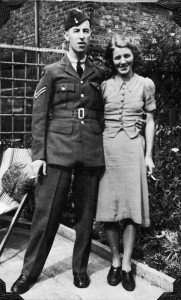 My mum told me stories about living with them at the start of the war while my dad was sent to France. They survived because they had a Morrison shelter; a metal frame stuck under the kitchen table to crawl under when the bombers came and tried to ruin the East End, subdue and then entice the working classes into a fascist revolt. My mum, then pregnant with my eldest brother crouched under the Morrison as the bombs fell. What chance did the Luftwaffe have with their solemnly fashioned rigidity, she told me how they had laughed partly in terror at the sight of the housecoat and nightie clad arses sticking out in all directions in the scramble to get under cover, how she’d cycled back from her duty as a midwife in Walthamstow as bits of shrapnel fizzed down around her, scared out of her wits.
My mum told me stories about living with them at the start of the war while my dad was sent to France. They survived because they had a Morrison shelter; a metal frame stuck under the kitchen table to crawl under when the bombers came and tried to ruin the East End, subdue and then entice the working classes into a fascist revolt. My mum, then pregnant with my eldest brother crouched under the Morrison as the bombs fell. What chance did the Luftwaffe have with their solemnly fashioned rigidity, she told me how they had laughed partly in terror at the sight of the housecoat and nightie clad arses sticking out in all directions in the scramble to get under cover, how she’d cycled back from her duty as a midwife in Walthamstow as bits of shrapnel fizzed down around her, scared out of her wits.
I have dug down through soft and hard layers of records over the years, found that my grandmother Flo and the Giggens family and Albert and the Stones moved around Bow, Hoxton, Spitalfields and Shoreditch, umbrella-makers, bookbinders and general labourers. I’ve traced the lines their dawdling movements make from one cheap rental slum and courtyard to the next, Fashion Street, The Bishopsgate Rookery, Dorset Street, others across the area and back again from labouring in the fields of Sussex, Essex, and Cambridgeshire. My Great-Grandfather Henry, who was familar with Newgate Prison for theft of food and money died relatively young making life yet more difficult for the family. All of the places have gone, removed, regenerated, gentrified, squeezing the centre of the heart sending pulses of people back out to the edge of the city again.
Albert, my Grandfather started work quite young. He worked in Hackney Wick for British Xylonite, – a proto-plastic – the British trade name for celluloid. Coal-gas production and the chemical byproducts from it formed the basis of a burgeoning industry. Xylonite helped keep the family afloat. When it became clear that it is an unstable explosive and wasn’t safe, the factory moved to fresh prime land away from the dense housing of Homerton and Hackney to leafier Hale End on edge of the Waltham Forest, and then expanded further, building a plant in Suffolk. Albert and Flo moved with it to Leyton, pulled further out away from the London they’d grown up in. He is listed as a Xylonite Turner; I suspect he may have made the forms that made the tooling that made the combs, brush handles, grips and clasps, the mirror backs and powder compacts, pots and tubs in that world of swirled tortoiseshell, cream and muted greens. It’s easy for us to take plastics for granted, it’s not the stuff of dreams, but then it was, and as it grew as an industry British Xylonite became Halex and diversified into Ping-Pong balls, dart flights and table-tennis paddles, toys and games followed. The company was bought and rebought again and again until it was transformed out of existence. Albert would have retired before it became Palitoy and started making Action Man. What remains of the Hale End plant is buried under another faceless Tesco, the only reminder a small plaque to remember the war dead who worked there.
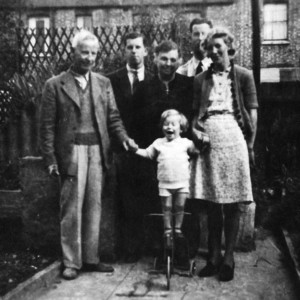 They moved to Bickley Road, a bigger house. I stayed there maybe twice. The same layout as the house I live in now only flipped left to right, tall and Edwardian, devoid of any Victorian frippary, it exactly mirrors the one we have on loan – the only difference is our lack of a cellar. My sister remembers coal and illicit lobsters delivered down the coal hole, the terror in the dark these strange crawling creatures clanking away over the blocks in the darkness. I was six when I last visited, my memories are short and faint; a smell of gas, cabbage, vinegar and beef dripping, the shape of the light in the doorways, a cabinet full of glasses and plates, the dimensions of a room in blocks of shade and tone, a small back garden, mostly grassed. A raised railway line opposite the front of the house, the ragged chatter of the trains a lullaby in the evening over the sound of adults drinking gin and whisky and playing brag as I fell asleep in a small front bedroom, the light a soft memory. Two of my Aunts, Bet and Grace lived there from the 1940s with my grandparents when they were still alive and stayed there until they too eventually died, paying a rent small enough to make the landlord plead, whine and cry, he had to bide his time and wait for them to shuffle away to convert it into flats. As I plastered and painted out what had been someone else’s lives, decorating part of our own house I found scraps of previous occupants, and also found myself wondering if after they had gone from Bickley Road, if anyone had wondered too, who the family was who lived there was, what stories the house held between it’s beams and walls.
They moved to Bickley Road, a bigger house. I stayed there maybe twice. The same layout as the house I live in now only flipped left to right, tall and Edwardian, devoid of any Victorian frippary, it exactly mirrors the one we have on loan – the only difference is our lack of a cellar. My sister remembers coal and illicit lobsters delivered down the coal hole, the terror in the dark these strange crawling creatures clanking away over the blocks in the darkness. I was six when I last visited, my memories are short and faint; a smell of gas, cabbage, vinegar and beef dripping, the shape of the light in the doorways, a cabinet full of glasses and plates, the dimensions of a room in blocks of shade and tone, a small back garden, mostly grassed. A raised railway line opposite the front of the house, the ragged chatter of the trains a lullaby in the evening over the sound of adults drinking gin and whisky and playing brag as I fell asleep in a small front bedroom, the light a soft memory. Two of my Aunts, Bet and Grace lived there from the 1940s with my grandparents when they were still alive and stayed there until they too eventually died, paying a rent small enough to make the landlord plead, whine and cry, he had to bide his time and wait for them to shuffle away to convert it into flats. As I plastered and painted out what had been someone else’s lives, decorating part of our own house I found scraps of previous occupants, and also found myself wondering if after they had gone from Bickley Road, if anyone had wondered too, who the family was who lived there was, what stories the house held between it’s beams and walls.
While I prodded at the difficult back teeth of the family, I discovered a Great-Uncle, one I’d never heard of; Albert’s brother Herbert. He was nine years my grandads junior, lived over a shop in Clapton with his wife Kate and son Richard. He was a clerk and born as he was in 1884 he could not cry ‘age’ and avoid the Great War, so off he went, wide-eyed, into the poor man’s adventure, He died near Arras in the March of 1917, another scattered relic of our DNA, buried in a French commune behind the lines with another English boy for company amidst the grand French graves. Curious then that one of my daughters should end up living barely 100 yards from his old house, another memory buried under a Tesco. I visited Herbert last year and placed a poppy on a stick at his feet and wished him goodnight, again wondering if I was the first from the line to visit him in that corner of nowhere, on an elbow of road.
Past Leyton and along the line the city’s density increases, the height greater, the terraces struck up by tower blocks, the spread more intricate, tunnels yawn and snap shut over the train and Stratford appears. Another link. This time my great-grandfather in the time drifts. Henry was born in Shoreditch-Le-Bow. The Parish of St Leonards. He grew up in Snowden Place in the 1850s, then moved to St John’s place not far from the bridge of Bow itself. They moved to Triangle Road in Hackney. None of the streets exist any more. The Giggins were not far away in Tower Hamlets. And so it ends we exit through tiled tubes checked into the city of dreams to meet the more recent additions to the line, spread as they are back into London, carving a life in the same streets.
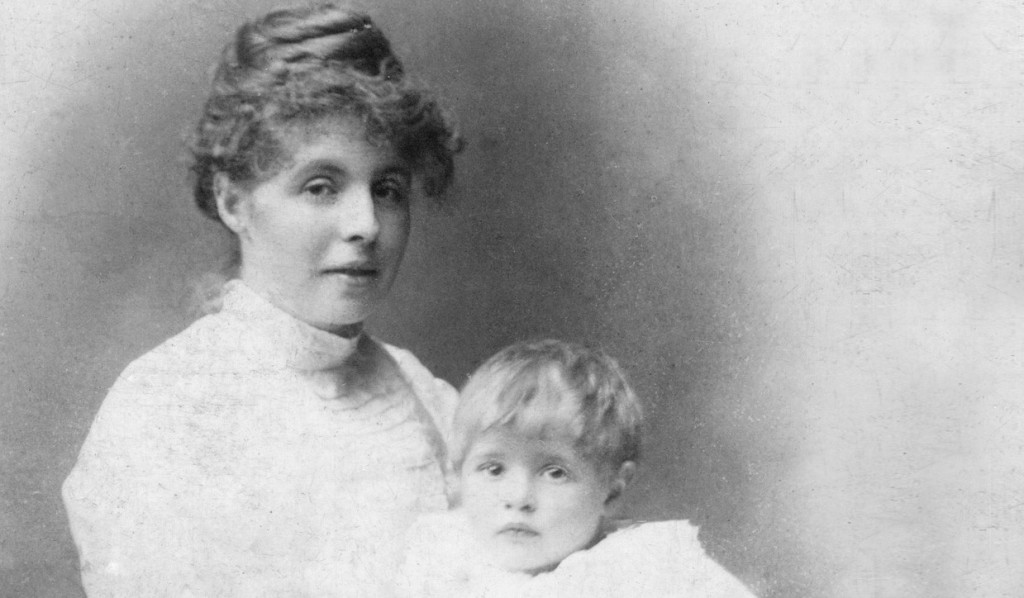
Middle Photo: Family Wedding – I’m not sure if there’s an adjective that describes a group of elderly women at a family wedding, but a ‘terrification’ springs to mind or a ‘glee’ looking at the face of the unidentified relative at the front.
Inset one: My mum and dad at Carnarvon Road, this was shortly before he was sent to France just as everyone else was leaving really, really fast.
Inset two: Bickley Road 1943, after they had been bombed out of Carnarvon Road. Grandparents Albert and Florence, Uncle Dick, my dad, Charles Stone, Chris my eldest brother and my my mum Grace (who I think may have been pregnant in this photo). This was taken after my dad returned from getting shot at in France, probably just before he went to India to make sure the RAF got their wages.
Bottom photo: My Grandmother Florence Stone (Née Giggins) cradling my Auntie Bet, around 1902. I love this photo.
Photographs: ©Nick Stone.
I saw three dogs flying, there was a man on the end
Squaring a circle and studying its end
I saw a drunk old lady pissing in a bin
It was far too high, she couldn’t stop
The man with the photograph failed to appear
In that kind of rain where an umbrella’s no use
The bird lay bleeding, I couldn’t break its neck
I get anonymous foot bells from a pope I never met
Don’t start me off
It’s beginning, to, and back again
Don’t start me off
Right now there’s a man who could take advantage
I wouldn’t like to spend an hour locked inside him
He always had an eye for it, we all threw a shoe
Nicely underlined, our table turned again
Colin Newman/Wire

